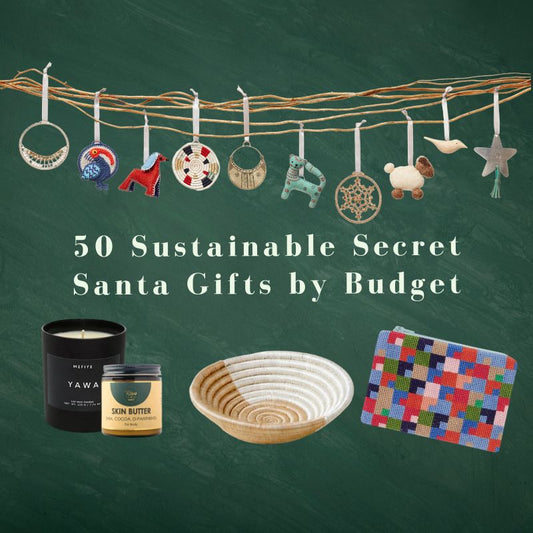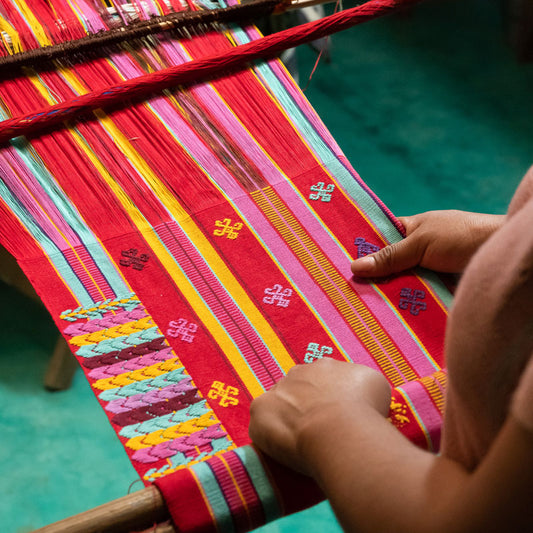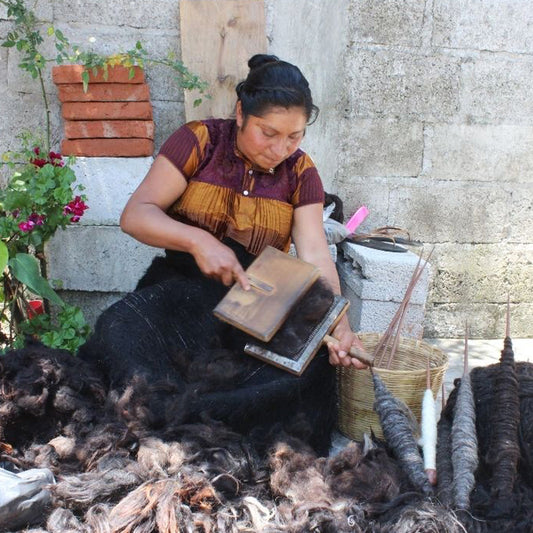We are delighted to announce the arrival of Mmaa Social to AKOJO MARKET! Mmaa's collection of handwoven pots, baskets and placemats are bursting with colour and vibrant patterns. At it's heart, Mmaa supports weaving collectives in Ghana providing income and financial independence for rural women, nearly all of whom are mothers. Mmaa means mother in the local dialect.
Sharing her passion on the transformative power of the Collectives on communities we caught up with Deb, Mmaa's Collaborator in Chief to shine a light on Mmaa.
For our readers, please can you share how the idea of Mmaa Social came to life?
I went to the Upper East Region of Ghana – a nine hour flight to Accra, ninety minute flight to Tamale, two and a half hour drive to the regional city of Bolgatanga then a further thirty to sixty minute drive to the rural communities – with CAMFED, the Campaign for Female Education, in July 2017. Dorcas Apoore, the young woman who founded the Collectives, was still in University at the time and was supported by CAMFED to pursue development studies. Within the first week of her studies and motivated by her own ability to continue her studies, she decided she would set up social programmes in her local community. At the time, there were about thirty women in the Collectives and we went to visit them to see her nascent NGO. The experience was life changing – it was truly the full circle of the cycle of development. The most powerful moment came when we heard children singing in the distance. We asked if they were on their way home from school and Dorcas responded, “They are on their way to sing to you. Before their Mothers were weaving with us, they had no money to buy them school shoes. Now they are in school and they all have uniforms.” In fact, we decided on Mmaa as a name because it means Mother in the local dialect and nearly all of the weavers are themselves mothers.
The baskets were love at first sight – true works of art. We decided to bring twenty baskets to the UK that arrived in October 2017 and eventually settled on two debut designs – the City and Emelia Baskets. We launched on April 27, 2018 and the rest is history! We have been so grateful to friends including Nadia Narain, Lisa Faulkner, Melissa Hemsley, Emma Watson (through Content Beauty) and Deborah Brett that helped grow Mmaa into an international brand that always keeps the weavers at its heart.

What is the Mmaa Social ethos?
We are non-profit and our primary objective is to help sustainably grow the weaving collectives and share their art with the world. We are committed to working with the team in Ghana to grow the Collectives so more women are able to benefit from their fair pay and social support programmes. Prior to Dorcas’ work, some of the women were working in extremely vulnerable and insecure jobs such as street hawking and travelling hundreds of miles away to urban centres leaving behind their families. Those that did remain home and weave had to source their own materials and were subject to the whims of middle men as to whether they would buy in the first place and then what small amount they would be paid. Today, straw is sourced for all the Collectives, dyeing is done as a community and they are assured of a fair price for their work.
In addition to ensure fair pay and conditions, we want the baskets to be recognised for the true works of art that they are. On that first visit to Ghana, we discussed how the baskets belonged in Vogue so it was quite an incredible moment when Emma Watson appeared in British Vogue with her Mmaa Basket.

Yourself and Dorcas are the embodiment of "women empowerment" - How do you support female weavers in their careers and lives or other?
The name of Dorcas’ NGO – Advocacy for Social Inclusion and Girls’ Education – encapsulates her drive to better the circumstances of women and girls in her community. She set up the Collectives to ensure they are fairly paid. In addition, they run financial literacy programmes as some of the weavers in the Collectives are illiterate and many will not have previously accessed banking services. They run regular sexual and reproductive health programmes and continue to fight for social inclusion for all. Most recently, they put together a skills training programme for teenage mothers that had previously dropped out of school. They are embedded within their communities and constantly striving to support the weavers and their families in every way possible. We are also passionate about ending period poverty. Girls were falling behind in their educations by missing school every month due to a lack of sanitary protection. For every basket purchased, a reusable sanitary pad kit is distributed to girls and young women in the community. It is truly an honour to work for such an incredible and inspirational group.
How has the pandemic changed things for you and your team?
The pandemic has given even more of a sense of urgency to the work that we do. When the first lockdown started in March 2020, we knew that we owed it to the weavers and their communities to keep them busier than ever – albeit working safely at home! The pandemic exposed inequalities on so many levels – locally and globally. In the case of Mmaa, there is no support network – no furlough or income support schemes- in rural Ghana so we knew it was our responsibility to ensure they would not suffer undue hardship. With the continued support of our incredible global community, we made several donations to help distribute food and we sold more baskets than ever in 2020. If anything, it gave us a laser focus as to why we do what we do – not only to share their beautiful craft – but also to ensure weavers are able to live with dignity and fair income.
There’s been a huge growing interest in curating a meaningful and conscious home. Why do you think this sort of philosophy is on the rise?
We love how curation of a home can tell a story of who we are. Thoughtfully sourced pieces are so much more meaningful. We are spending so much time in our homes these days and, at times like these, we all have plenty of time to reflect on what is meaningful to us. I also believe that increasing social awareness is translating into more discernment at what people are buying more generally.
As someone we associate with colour, do share with us the secret to mixing bright colours in a sophisticated way!
Yes, we do love colour! It is a revelation every time the baskets arrive in a cacophony of colour – they look so incredible and we love doing “class photos” with new baskets. The weavers themselves are also our colour muses as when you are with the Collectives, you can’t help but get swept away by all the vivid colours of their dresses. I love putting monochrome baskets in rooms with lots of colourful cushions and bright art but equally find our bold and exuberantly coloured baskets work well in so many different palettes. The best thing to do is experiment and not be shy!
For anyone wanting to start a sustainable brand, what advice would you have on ethical sourcing?
Please, please, please ask the basic questions. I am surprised when I speak to brands based on sustainability and they cannot answer straightforward questions on provenance. How much are the artisans paid? It is surprising that some people still pay middle men without asking how much of it actually gets to the artisans. How are they paid? Is the money going directly to the artisan? Unfortunately, money can often be paid to husbands or fathers in the case of female collectives and the women never have control over their money. Are there any expenses deducted from the artisans’ pay? Some people will claim to pay fairly but then deduct above market amounts for raw materials. If at all possible, try to work directly with collectives so the most money possible is going back directly to artisans. Make sure you understand exactly how your supply chain works.
Anything else you'd like to share..
Thank you Akojo for including Mmaa on your platform! There is so much strength in community and we are proud to be part of yours.



